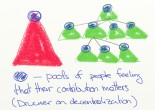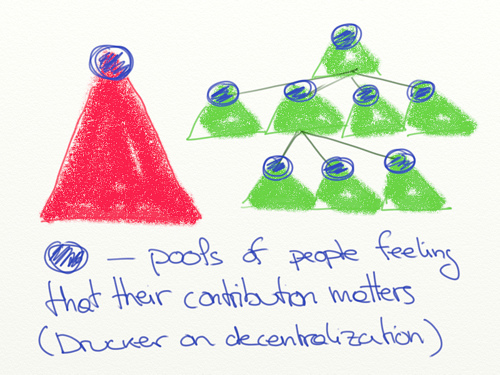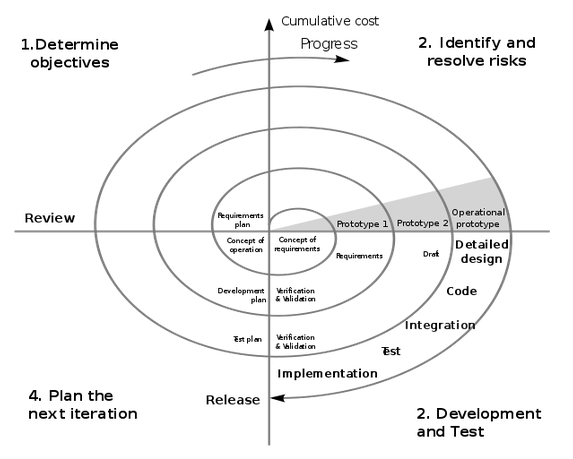Decentralisation is a multi-dimensional concept. It has been applied with varying degrees of success across many different contexts. Decentralisation programmes are widely funded in developing countries by international institutions such as the World Bank and the UNDP. But because of the variety of contexts in which it is used, scholars do not agree on a precise definition, which make it difficult to pin down.
So, let’s start with a hypothesis – Decentralisation is a response to the problems of centralised power and centralised systems. And a real-life example.
Gosplan (an acronym of Gosudarstvenniy Komitet po Planirovaniyu), the Soviet Union’s State Committee for planning, was formed in 1921 and dissolved in 1991, and its job was to co-ordinate the economic plans of the various Soviet republics. Though achieving some success in times of crisis, over time its 5-year plans formulated at the centre became increasingly divorced from reality. Watch this clip from Adam Curtis’s BBC “Pandora’s Box” documentary and you’ll see why. I particularly like the female planner’s comment at 3:10 about platform shoes!
[youtube=http://www.youtube.com/watch?v=o3g-djwLgyc&w=420&h=315]
While I’m not saying that today’s writers of today’s coursebooks are like Gosplan engineers, is there not some truth in the statement that by the time a coursebook, or coursebook series, is commissioned, written, edited, printed and published – it’s already out-of-date? This exact point was raised in an excellent post about self-publishing on elt jam. This lack of information at the centre raises an important point– that centralised systems are out-of-touch and not responsive to local needs.
So criticisms of centralised systems might include the following:
- they do not have access to important information, making them out of touch
- they cannot adapt easily to changing circumstances
- they can be cumbersome and self-perpetuating
While attacking coursebooks seems to be the zeitgeist in ELT right now (though this is changing I think), I’ve also worked in institutions with centrally planned syllabuses which were equally out-of-touch, badly put together and pedagogically sterile . Furthermore, what happens in institutions where centrally planned syllabuses are badly drafted? Based on classroom reality and experience, you then have a large group of teachers ignoring or ‘driving round’ the syllabus –exactly the opposite of what is intended!
So, if we think of Decentralisation as a response to the problems of Centralisation – can we break this complex idea down into manageable pieces? That is, what are the forms of Decentralisation?
Across the literature, there are basically three forms, or processes of Decentralisation (with some disagreement on the fourth):
Devolution
This is often labelled ‘real Decentralisation’ as it involves real autonomy from the central system and a real transfer of powers. This is close to full independence from the centre, and the devolved authories have legal status, can elect representatives and raise their own revenue. The devolution of Scotland and Wales would be a good example here as both countries now have their own parliaments (though with Westminster retaining some important powers).
Deconcentration
This involves a shift of decision-making authority to lower levels, but the lower levels are still upwardly accountable to the centre. This could just involved a transfer of authority from central government officials, to regional government officials.
Delegation
This is the transfer of managerial responsibility for specific functions only to other agencies or quasi-autonomous organisations. Again, these units are upwardly accountable. Examples would be public corporations, transport authorities and regional development corporations.
*There is also the fourth form Privatisation/ Divestment – but there is no agreement on whether this is a form of Decentralisation, as the aims of privatisation are arguably different from those above
In the world of ELT, a strong form of Decentralisation would be Devolution, where power and responsibility is devolved down to learners. Working with the teacher they would set their own syllabus, organise activities amoung themselves, set goals and evaluate progress.
What makes this different from a ‘negotiated syllabus’ or Learner-Centred Curriculum?
Good question! At first glance, not much. But I think that a syllabus is a much more formal arrangement (coming from the Latin for list). I envision a more dynamic and freer way of doing things based on modern innovations. For example, at an Unconference, EduCamp or LinguaCamp, the participants decide on the content – but is this a syllabus? Or something else?
Thinking about Decentralisation, I’ve also been influenced by the essay ‘The Cathedral and the Bazaar’ by Eric S. Raymond which talks about the potential of open source technology (p.1)
Linux is subversive. Who would have thought even five years ago
(1991) that a world-class operating system could coalesce as if by
magic out of part-time hacking by several thousand developers scat-
tered all over the planet, connected only by the tenuous strands of
the Internet?
Also, Decentralised Teaching and Learning could operate by learning cycles, or iterations, where through each cycle learners would become more used to the process and better able to shape their own learning. This is similar to Boehm’s (1988) Spiral Design Model:
The repeated iterations over time (similar to how software is designed), could go some way to changing learner expectations, and means that the course can build on its successes and try and elimate elements which don’t work.
What might the effects be of Decentralising Teaching and Learning?
Well, I argue that a real Decentralisation, involving a devolution of power down to the learner can produce the following effects:
– increased enthusiasm for learning
– higher level of engagement with the target language
– more responsibility for learning
– better service delivery, as learners and teacher will negotiate something in response to local needs
– long-term resilience in language learning
These are big claims! But ones that I aim to test. As the old saying goes, you can’t cross a chasm in two small steps.
But why should we bother? What’s the advantage of Decentralising Teaching?
One of the reasons why Decentralisation has spread into so many areas is that it satisfies both traditionalist and radicals. Traditionalists like it because it’s a more efficient use of resources, radicals because it devolves power down from the centre, resulting in more equality. Decentralised teaching might be able to institutionise some of the more radical teaching approaches that up to now, have remained largely the preserve of experimental lessons on teacher training courses.
Another reason is that with globalisation and with the explosion of ICT, there are so many more opportunities to get access to your chosen target language. This wasn’t possible even 10 years ago. If we don’t reform the way languages are taught, then learners will just find better ways to learn without us (witness the explosion of popular sites such as how to learn any language.com and fluent in three months as well as many others)!
For the teacher, this of course means that having to resign their role as central authority figure, which can be destabilizing. But I think if the results in terms of learning are worth it – then why not?
Let me give an example here. I have team-taught quite a few times during my teaching career. It’s actually a very strange experience at first, and definitely not easy. But the learners involved almost without fail gave glowing feedback on team-teaching and it was a big success in terms of learning objectives (though quite a strain on the nerves…). This could be a novelty effect but I don’t think so. Team-teaching, at its best, means that the teachers can be more responsive to learners, more innovate and it certainly raises engagement in my experience (I heard similar comments made about the 2011 Teaching Unplugged conference in Barcelona).
Although the following video is from a state school in the US, I think you get a flavour (or should it be flavor?) of the advantages of team-teaching
[youtube=http://www.youtube.com/watch?v=GHIoqdAQ-Fs&w=420&h=315]
Ok, I’ve said more than enough. I just wanted to sketch out a basic theoretical explanation of Decentralisation, and relate the concept to Decentralised teaching. If you have any questions or comments, or would like to write a guest post – just drop me a line, and if you like the blog, please share or tweet!
paul
Future posts include:
How I failed to learn language…x…
Decentralised Teaching in action (1)
Practical Sustainability for teachers
Guest posts!
References
Sylvia Libow Martinez, Gary S. Stager (2013). Invent to Learn: Making, Tinkering and Engineering in the Classroom. Constructing Modern Knowledge Press.
UNDP Working Paper (1999). Decentralization: A sampling of definitions. Joint UNDP-Government of Germany Evaluation of the UNDP Role in Decentralization and Local Governance.



HelloI think the case is always hanepping everywhere not least in my country I guess deceive others is a crime even though it is intended to bring new students to be familiar with the old students.Thanks